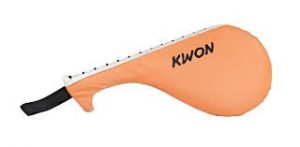Sometimes during target practice a student will repeatedly miss the striking pad. It can be incredibly frustrating when a beautifully executed kick becomes useless through a lack of accuracy. But how does someone improve their accuracy?
When a skill is first being acquired, a great deal of attention is focused on component parts of the technique. In an attempt to hit the target a new student will try to manipulate their bodies in all sorts of ways; they attempt to lift a leg sooner, later or steeper for example. This is a necessary part of learning something new, but for someone who has moved beyond basic skill acquisition, conscious control will tend to disrupt the overall consistency of the movement. This will make them less, not more accurate.
Recognising that consciously monitoring every aspect of the skill is making them worse not better, the athlete may next try to attempt to empty or clear their mind before executing a technique.
 But…. thinking isn’t the issue – it’s thinking the wrong thing that is. One approach that can improve accuracy is to shift the attention from internal monitoring to something more externally focused. In Hapkido, focusing externally means thinking about what you’re trying to hit – the movement beyond your body. Most people start with being overly aware of everything else happening in the room and become distracted. After that the focus shifts to the target, but many still don’t differentiate the handle from the kicking area. Finally the focus moves to the kicking area; and by the time they are ready to test for their black belts the individual can easily pinpoint the exact square centimetre they are aiming for. This means that those with a more concentrated and smaller area of focus achieve a more accurate kick.
But…. thinking isn’t the issue – it’s thinking the wrong thing that is. One approach that can improve accuracy is to shift the attention from internal monitoring to something more externally focused. In Hapkido, focusing externally means thinking about what you’re trying to hit – the movement beyond your body. Most people start with being overly aware of everything else happening in the room and become distracted. After that the focus shifts to the target, but many still don’t differentiate the handle from the kicking area. Finally the focus moves to the kicking area; and by the time they are ready to test for their black belts the individual can easily pinpoint the exact square centimetre they are aiming for. This means that those with a more concentrated and smaller area of focus achieve a more accurate kick.
So can you help this process?
Firstly you can try to focus on the task at hand, not everything else going on in the room, or in your life. Rather than trying to avoid other thoughts – focus on identifying the types of thoughts that will help you. This might mean developing your own pre-performance routines, using imagery or specific breathing techniques to control your mood/emotions, or simply having the loudest “yes sir” or “yes ma’am” in the room. These simple but powerful mental techniques can all be useful tools to help develop the relaxed concentration that’s needed to perform optimally.
You can also ask yourself how clear you are about the outcome you are trying to achieve. In questioning this you are then able to narrow your focus which in turn will make it much more likely for you to achieve your desired outcome.
Improving accuracy then, is about attention and focus – something as relevant inside the dojang (training hall) as outside.
…….
Read more about attention.
